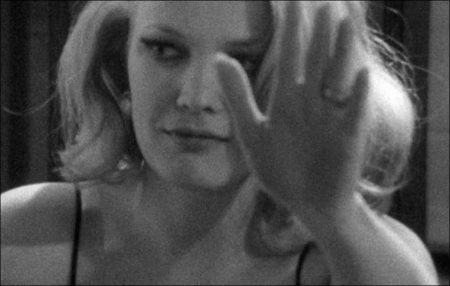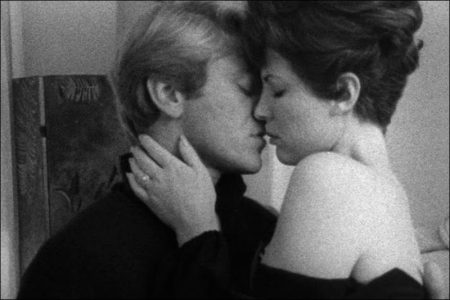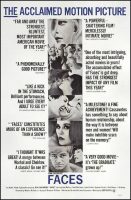
Faces movie storyline. The fourteen year marriage of upper middle class Angelenos Richard and Maria Forst has long been crumbling. They generally don’t talk about their problems, but both are well aware that their marriage is less than happy. So it still comes as a bit of a surprise to Maria when Richard tells her that he wants a divorce, is leaving the house, and not coming back.
Where Richard eventually goes is to the apartment of Jeannie Rapp, an escort he has been seeing and with who he may believe he is in love, with the feelings possibly returned. Meanwhile, Maria decides to head out for the evening to a go-go club with three of her married friends, each who is in a different state of happiness within her own marriage. They are picked up by a player named Chet, who they take back to the Forst home for the remainder of the evening to continue the party. This evening will further illuminate to each of Richard and Maria how they feel about their individual lives.
Faces is a 1968 American drama film written and directed by John Cassavetes. It stars John Marley, Gena Rowlands, Lynn Carlin (in her acting debut), Seymour Cassel, Fred Draper and Val Avery. The film won two awards at the 29th Venice International Film Festival and received three nominations at the 41st Academy Awards. In 2011, it was added to the National Film Registry for being “culturally, historically, or aesthetically significant.”
Film Review for Faces
John Cassavetes’ “Faces” is the sort of film that makes you want to grab people by the neck and drag them into the theater and shout: “Here!” It would be a triumphant shout. Year after year, we get a tide of bilge that passes for “the American way of life” in the movies.
We know it isn’t like that. We don’t live that way and neither does anyone we know. What Cassavetes has done is astonishing. He has made a film that tenderly, honestly and uncompromisingly examines the way we really live.
The central characters are middle-aged, middle-class and rather ordinary: a man and his wife. They have everything in the world they desire, except love and a sense of personal accomplishment. They’ve become consumers in the most cruel sense of that word: Their only identity is as economic beings who earn and spend money to sustain a meaningless existence. They don’t do anything, or make anything, or create anything. They use.
This is not only a crisis but a trap, because society has left them stranded without any means of breaking out. During a long night when their marriage reaches the breaking point, they discover only two ways to kick loose: alcohol and adultery. One of the problems with this class of society is that it provides so few ways to boil over.
The film begins with the man (John Marley), a fairly prosperous executive, stopping off at a prostitute’s apartment on his way home. The hooker (Gena Rowlands) and her roommate are already entertaining two men, and there is some alcoholic give-and-take punctuated with stale dirty jokes (has anybody noticed that dirty jokes have simply passed out of the repertory of most people under 30?).
Marley eventually goes on home, and there is a scene with his wife (Lynn Carlin) that is one of the best single scenes I’ve ever seen. They sit at the dining room table and talk about sex, and just in the way they form their sentences you can see they’re terribly “sophisticated” and verbal, but really very frightened and repressed.
In a burst of alcoholic ethics, Marley announces he wants a divorce, and telephones the call girl while his wife watches. We then follow two stories, Marley’s evening with the prostitute, and his wife’s outing with three women friends.
Handled incorrectly, these scenes could all be mawkish stereotypes. But Cassavetes has pressed beneath the stereotypes and down to the level where these things really do happen.
Among the five awards “Faces” won at the Venice Film Festival was one to John Marley, as best actor. It was deserved, but Seymour Cassel also deserves mention, and perhaps an Academy Award supporting actor nomination, for his performance as the hippie.
Lynn Carlin was reportedly a secretary at Screen Gems when Cassavetes cast her as Marley’s wife. This is her first professional role; she brings depth and truth to it.
Gena Rowlands (in real life, Cassavetes’ wife) avoids the heart-of-gold cliches and plays a prostitute who has her own problems and a deep reservoir of human sympathy as well.
Faces (1968)
Directed by: John Cassavetes
Starring: John Marley, Gena Rowlands, Lynn Carlin, Seymour Cassel, Fred Draper, Val Avery, Dorothy Gulliver, Joanne Moore, Darlene Conley, Gene Darfler, Elizabeth Deering, Christina Crawford
Screenplay by: John Cassavetes
Production Design by: James Joyce
Cinematography by: Al Ruban
Film Editing by: Maurice McEndree, Al Ruban
Set Decoration by: Lady Rowlands
Art Direction by: Phedon Papamichael
Makeup Department: Harold Chaleff
Music by: Jack Ackerman
MPAA Rating: None.
Distributed by: Continental Distributing
Release Date: October 17, 1968 (UK), November 24, 1968 (USA)
Views: 215

